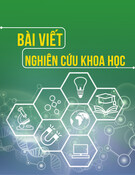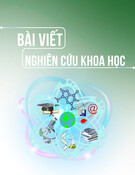
TNU Journal of Science and Technology
230(08): 120 - 126
http://jst.tnu.edu.vn 120 Email: jst@tnu.edu.vn
INVESTIGATING HANOI UNIVERSITY OF SCIENCE AND TECHNOLOGY
ELITECH STUDENTS' PERCEPTIONS OF HOW WARM-UP ACTIVITIES
MAY SUPPORT THE LEARNING OF ENGLISH SMALL TALKS
Nguyen Hanh Dao*, Nguyen Minh Nguyet, Nguyen Thi Quynh Anh, Tran Thu Trang
Ha Noi University of Science and Technology
ARTICLE INFO
ABSTRACT
Received:
07/12/2024
This study investigates the role of warm-up activities in supporting the
learning of English small talks among Elitech students at Hanoi University of
Science and Technology. The problem addressed is the limited focus on
communicative English skills in technical education, where students often
lack opportunities to practice casual conversation in English. To explore how
warm-up activities might enhance this aspect of language learning, the study
employed a qualitative research design. Data were collected through focus
group interviews with seven students and in-depth interviews with four
participants enrolled in the IELTS Speaking 1 course. Thematic analysis was
used to identify patterns in students’ perceptions and experiences. The
findings revealed that warm-up activities contributed to a low-stress,
engaging, and socially supportive learning environment. Key features such as
real-life relevance, peer interaction, and enjoyment were found to increase
student confidence and participation. These results suggest that integrating
warm-up activities into English instruction can significantly improve students’
small talk skills and overall communicative competence. The study offers
pedagogical implications for enhancing language education in technical
programs and calls for broader implementation of such practices.
Revised:
11/6/2025
Published:
11/6/2025
KEYWORDS
Warm-up activities
Small talks
Student language perception
Learning styles
Technical non-English majored
students
NGHIÊN CỨU NHẬN THỨC CỦA SINH VIÊN ELITECH TẠI ĐẠI HỌC BÁCH
KHOA HÀ NỘI VỀ NHỮNG HỖ TRỢ CỦA HOẠT ĐỘNG KHỞI ĐỘNG
VỚI VIỆC HỌC NÓI TIẾNG ANH
Nguyễn Hạnh Đào*, Nguyễn Minh Nguyệt, Nguyễn Thị Quỳnh Anh, Trần Thu Trang
Đại học Bách khoa Hà Nội
THÔNG TIN BÀI BÁO
TÓM TẮT
Ngày nhận bài:
07/12/2024
Nghiên cứu này khảo sát vai trò của các hoạt động khởi động trong việc hỗ
trợ sinh viên chương trình Elitech tại Đại học Bách Khoa Hà Nội học nói hội
thoại ngắn bằng tiếng Anh. Vấn đề đặt ra là kỹ năng giao tiếp tiếng Anh
thường bị xem nhẹ trong chương trình đào tạo kỹ thuật, khiến sinh viên thiếu
cơ hội luyện tập giao tiếp thông thường. Để tìm hiểu cách các hoạt động khởi
động có thể cải thiện kỹ năng này, nghiên cứu áp dụng phương pháp định
tính. Dữ liệu được thu thập thông qua phỏng vấn nhóm với bảy sinh viên và
phỏng vấn sâu với bốn sinh viên đang theo học học phần IELTS Speaking 1.
Dữ liệu được phân tích theo phương pháp mã hóa chủ đề nhằm khám phá các
lớp suy nghĩ và trải nghiệm của người học. Kết quả cho thấy các hoạt động
khởi động giúp tạo môi trường học tập tích cực, giảm căng thẳng, tăng sự gắn
kết và tương tác xã hội. Các yếu tố như tính thực tiễn, tính tương tác nhóm và
yếu tố giải trí góp phần nâng cao sự tự tin và mức độ tham gia của sinh viên.
Việc tích hợp các hoạt động này vào giảng dạy tiếng Anh có thể nâng cao
đáng kể kỹ năng hội thoại ngắn và năng lực giao tiếp nói chung, đồng thời
góp phần cải thiện chất lượng giáo dục ngoại ngữ trong các chương trình đào
tạo kỹ thuật và các bối cảnh giáo dục rộng hơn.
Ngày hoàn thiện:
11/6/2025
Ngày đăng:
11/6/2025
TỪ KHÓA
Hoạt động khởi động
Cuộc nói chuyện ngắn
Nhận thức ngôn ngữ của sinh viên
Phong cách học tập
Sinh viên kỹ thuật không chuyên
tiếng Anh
DOI: https://doi.org/10.34238/tnu-jst.11661
* Corresponding author. Email: dao.nguyenhanh@hust.edu.vn































